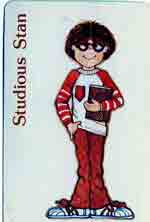 Last Friday I was back at it, serving as a judge in the citywide Scripps Spelling Bee. I served as a judge last year, and remember sitting in the audience when my son competed four years ago. Also on my panel was newshound extraordinaire Carol Marin, who is a neighbor of the school–St. James Lutheran–that hosted the bee. Oh, it was a time for five-day deodorant pads. The tension was so thick in that room we had to take extra time to tell the kids to get up and shake their arms.
Last Friday I was back at it, serving as a judge in the citywide Scripps Spelling Bee. I served as a judge last year, and remember sitting in the audience when my son competed four years ago. Also on my panel was newshound extraordinaire Carol Marin, who is a neighbor of the school–St. James Lutheran–that hosted the bee. Oh, it was a time for five-day deodorant pads. The tension was so thick in that room we had to take extra time to tell the kids to get up and shake their arms.
My hardest job up at the table was holding my emotions in check. When a kid has been trying very hard for a couple of rounds, and succeeded in spelling all the ridiculous words that have been thrown at him, it breaks your heart to watch him or her stumble over a word for a hard German cheese (Backstein), or a mountain village in the Caucasus (aul). I recognized one girl from another year when she competed. A dead-ringer for Drew Barrymore, she was probably a fourth grader when I first saw her, and was now a poised sixth grader. She lost in the later rounds, and kept a stiff upper lip, even with her whole family right there in the front row. Almost all the kids tried really hard (some were completely expressionless), and it was wrenching to watch them go down, but there has to be a winner. WBEZ was there covering it, and they’ve posted a slideshow of the day. Click here if you want to see that.
This year I was struck by the timeliness, or lack thereof, of some of the words. For someone who grew up in the 1960s like me, a muumuu is not an exotic item (a faux-exotic one, sure, but hell, Totie Fields used to wear them). Whether that would make it easier to spell or not, I don’t know, but certain words I feel familiar with (struedel, parfait, lariat, wampum) were probably very foreign to these kids. And while I shouldn’t make generalizations, I wonder if city kids have any idea what a paddock, a wiseacre, a cadenza, or a babushka is. The kids showed us that familiarity isn’t crucial for spelling, but I think it would have to help at least a little bit.
Eventually we were down to two kids, a fifth grader and a sixth grader who went back and forth with correct spellings, obviously having memorized the list of 250 words that everyone had been given. As a judge’s prerogative, we turned to another list of 250 words that the contestants had never seen before.
We got through about a dozen more words, back and forth, but eventually the champion spelled two words correctly in a row. (One more word trapped in time that a late contestant didn’t know: McCoy, as in “the real McCoy.”) This second list had some terrific words that I intend to use in my everyday conversation, just to keep people on their toes. As the Reader’s Digest used to say, It Pays To Increase Your Word Power!
graphospasm — a hand or finger cramp brought on by excessive writing.
flurriment — a state of being agitated
spilth — something that has been allowed to pour, splash, or fall out (as of a container) and be wasted, lost or scattered
frigorific — causing cold (not “Friggerrific!”, though that might become a favorite expletive)
Yiddishkeit — Jewish way of life
rantipole — characterized by a wild unruly manner or attitude
succivorous — feeding on the sap of plants
fanfaronade — empty boasting, bluster
quodlibet — a subtle or debatable point, often a question posed for argument or disputation
breviloquence — shortness of duration of speaking.
And with that, I will save the rest of the list for another day.


Last year 2 of my 3 elementary age kids were their classes’s (sp?) representatives in the school spelling bee. The third spells even worserer (sp?) than her dad and take hours to finish her homework, although her fraternal twin finishes her homework in minutes. Just like twitch fibers in a runner’s leg, any kid who can spell succivorous without giggling probably has above average wiring in their brain.
That goes for adults, too, and frankly eliminates me. The giggling part, at least.